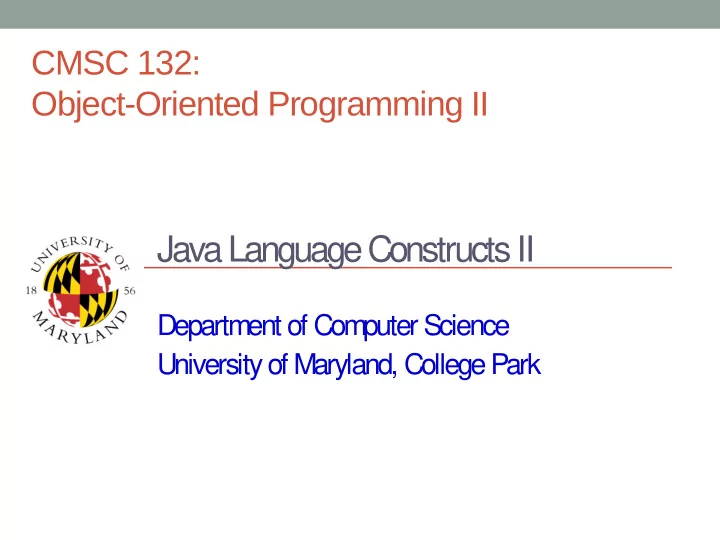

CMSC 132: Object-Oriented Programming II Java Language Constructs II Department of Computer Science University of Maryland, College Park
Announcements • Regarding TA Room Usage – No food or drinks are allowed in the TA room. – Please do not rearrange the furniture. – No independent studying (not a study lounge). – Please be considerate of fellow students who need help. Once you have spoken with your TA please clear out to allow other students the same opportunity. • Link with information at – http://www.cs.umd.edu/~nelson/taRoom/
Comparator Interface • Comparator public int compare(T a, T b) – ● Negative if a < b, 0 if a == b, positive if a > b • Properties Imposes total ordering on objects of a class – Provide alternatives to natural ordering – Supports generics – ● Example: class myC implements Comparator<Foo>{ … } Use as parameter for sort function – ● Example: Collections.sort(myFooList, new myC( ) ); • Example: comparatorExample
Three Levels of Copying Objects Assume y refers to object z ● Reference copy y ● Makes copy of reference z … x ● x = y; ● Shallow copy y z ● Makes copy of object … ● x = y.clone( ); x z' ● Deep copy ● Makes copy of object z and all … y z objects (directly or indirectly) referred to by z x … z'
Cloning • Cloning Creates identical copy of object using clone( ) – • Cloneable interface – Supports clone( ) method Returns copy of object – ● Copies all of its fields ● Does not clone its fields ● Makes a shallow copy • Example: cloning package
Garbage Collection • Concepts – All interactions with objects occur through reference variables – If no reference to object exists, object becomes garbage (useless, no longer affects program) • Garbage collection – Reclaiming memory used by unreferenced objects – Periodically performed by Java – Not guaranteed to occur – Only needed if running low on memory
Destructor • Description Method with name finalize() – Returns void – Contains action performed when object is freed – Invoked automatically by garbage collector – Not invoked if garbage collection does not occur ● Usually needed only for non-Java methods – • Example class Foo { void finalize() { … } // destructor for foo }
Initialization Block • Definition – Block of code used to initialize static & instance variables for class • Motivation – Enable complex initializations for static variables ● Control flow ● Exceptions – Share code between multiple constructors for same class
Initialization Block Types • Static initialization block – Code executed when class loaded • Initialization block – Code executed when each object created – (at beginning of call to constructor) • Example class Foo { static { A = 1; } // static initialization block { A = 2; } // initialization block }
Variable Initialization • Variables may be initialized – At time of declaration – In initialization block – In constructor • Order of initialization – Declaration, initialization block (in the same order as in the class definition) – Constructor
Variable Initialization – Example class Foo { static { A = 1; } // static initialization block static int A = 2; // static variable declaration static { A = 3; } // static initialization block { B = 4; } // initialization block private int B = 5; // instance variable declaration { B = 6; } // initialization block Foo() { // constructor A = 7; B = 8; } // now A = 7, B = 8 } // initializations executed in order of number
Static Block Example public class Person { … // STATIC INITIALIZATION CREATES OBJECT ONCE private static final Date MILLENIUM; static { Calendar gmtCal = Calendar.getInstance( TimeZone.getTimeZone("GMT")); gmtCal.set(2000,Calendar.JANUARY,1,0,0,0); Date MILLENIUM = gmtCal.getTime(); } public boolean bornBefore2000(){ // FASTER! return birthDate.before(MILLENIUM); } }
Recommend
More recommend